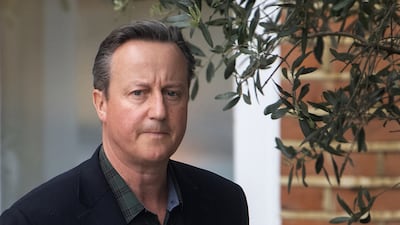Former UK prime minister David Cameron has accused critics of the government’s flagship counter-radicalisation programme Prevent of “enabling terrorism” through a concerted campaign to undermine the strategy.
Mr Cameron criticised a “small but vocal range of fringe groups” for misrepresenting the two-decade-old strategy as an attack on Muslim communities. He said Prevent remained an essential tool to tackle radicalisation.
“I believe those who refuse to challenge the falsehood surrounding Prevent are guilty of a form of ‘passive tolerance’ whereby society fails to interfere in minority communities for fear of appearing racist,” Mr Cameron wrote in the foreword of a new report on the anti-Prevent campaign by right-wing think tank Policy Exchange.
“So just as we need to counter the Islamist extremist narrative, we need to counter the anti-Prevent narrative. We need to show that delegitimising counter terrorism is, in essence, enabling terrorism.”
The report identified groups such as the Muslim Council of Britain, Muslim Engagement and Development, and Cage, which has previously described the policy as “fundamentally racist and Islamophobic”.
Cage said the report — Delegitimising Counter-Terrorism: The Activist Campaign to Demonise Prevent — smeared Muslim organisations for “challenging the policy and holding the government to account”.
Muhammad Rabbani, Cage's managing director, said: “The report promotes a false reality of ‘unopposed activists’ critiquing Prevent in order to explain away communities’ wholesale rejection of Prevent.”
The Prevent policy was part of the UK’s counter-terrorism strategy introduced in 2003 but expanded after the July 7, 2005 attacks on the London transport network, in which 52 people were killed.
It is one part of a four-pronged strategy and is designed to stop people being drawn into terrorism.
It has been strengthened by successive governments, including under David Cameron, and now requires schools, universities, councils and hospitals to flag up concerns about suspected radicalisation.
In January 2019, the government announced a review of the programme after some Muslim leaders claimed they were being unfairly targeted and the tactic was being used to spy on Muslim communities. A former charities regulator, William Shawcross, was appointed to head the review in 2021.
His predecessor, Alex Carlile, a former reviewer of terrorism legislation, stood down after a legal challenge over his previously stated strong support for the strategy.
The government has already said that it plans to shake-up the strategy after a series of attacks where terrorists had been flagged by the counter-terrorism strategy or had slipped through the net.
They include Ali Harbi Ali who was referred to the scheme before murdering David Amess, a Conservative party MP.
The Policy Exchange report said campaigns that were “led by or strongly featured Islamist groups” had sought to undermine Prevent and had intensified their efforts during the preparation of the Shawcross report.
It called for a rapid-rebuttal unit to be set up to counter anti-Prevent messages and for funding to be withheld from groups that seek to undermine the strategy.
One of the authors of the report, John Jenkins, a former ambassador to Saudi Arabia who carried out a review of the Muslim Brotherhood in 2014, said that the government had failed to push back against the anti-Prevent narrative.
“One of the key challenges for counter-extremism and counter-extremism efforts in the UK is the dissemination of disinformation, saying that efforts like Prevent are inherently and unreformably Islamophobic.”
The Muslim Council of Britain said the report had “gone out of its way to say that the MCB has consistently opposed counterterror measures.
“It fails to mention that the MCB has also loudly and consistently spoken and acted against terrorism,” it said in a Tweet.
“The last time we checked, we were a vibrant democracy that encouraged robust debate and scrutiny of policy.”


